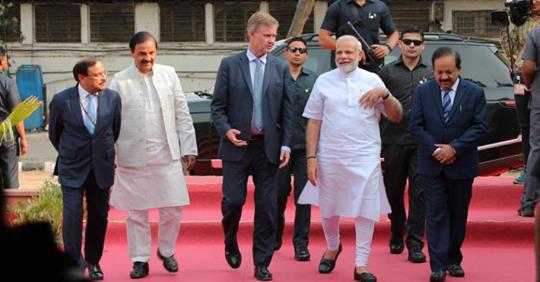India Sets Pace in Global Race to Beat Plastic Pollution
India went big in their commitment to Beat Plastic Pollution today, with an announcement to eliminate all single-use plastic in the country by 2022. This unprecedented ambitious move against disposable plastic will drastically stem the flow of plastics from 1.3 billion people and business in the fasted growing economy in the world.

Prime Minister Narendra Modi hailed World Environment Day as the start of a global movement to defeat single-use plastics, highlighting India’s rapid economic development can be done in a way that is sustainable and green.
“It is the duty of each one of us, to ensure that the quest for material prosperity does not compromise our environment,” Modi said. “The choices that we make today, will define our collective future. The choices may not be easy. But through awareness, technology, and a genuine global partnership, I am sure we can make the right choices. Let us all join together to beat plastic pollution and make this planet a better place to live.”
Solidifying India’s leadership of global sustainability, Dr. Harsh Vardhan, Minister of Environment, Forest and Climate Change pledged to “achieve the India of our dreams,” announcing that single-use plastics would be banned in all Indian states by 2022.
“This has been the biggest, most resonant World Environment Day ever, thanks to the leadership of our global host India,” Erik Solheim, Head of UN Environment, said. “India has made a phenomenal commitment and displayed clear, decisive and global environmental leadership. This will inspire the world and ignite real change.”
The announcement was a powerful finale after weeks of activities around the country, seeing millions of Indians – policymakers, celebrities, business Moghuls and small entrepreneurs, innovators, environmentalist, and activists – come together to collectively take action on plastic pollution.
Among the highlights from the national celebrations was Modi’s commitment to join UN Environment’s Clean Seas campaign, which seeks to turn the tide on marine litter. India has 7,500 km of coastline – the 7th longest in Asia. As part of this commitment, the government will establish a national and regional marine litter action campaign as well as a program to measure the total marine plastic footprint in India’s coastal waters.
Other notable steps towards a pollution-free India included a partnership between UN Environment and the Indian Board of Control to ‘green cricket’ across the country, and a pledge to make 100 national monuments litter-free.
The country further showcased innovative solutions to environmental challenges. The western state of Maharashtra introduced an urban e-mobility program to scale back emissions. Meanwhile, the state of Andhra Pradesh in India’s southeast launched a scale-out plan to transition 6 million farms from conventional synthetic chemical agriculture to Zero-Budget Natural Farming.
As part of the official ceremony in Delhi, the Indian government, in collaboration with UN Environment also launched a joint World Environment Day Report: “Single-use Plastics: A roadmap for Sustainability”. Presenting case studies from more than 60 countries, the report analyzes the complex relationships in our plastics economy and offers an approach to rethink how the world produces, uses and manages single-use plastics.
After months of preparations and thousands of events, the culmination of commitments and action have made this World Environment Day the most successful to date, setting the bar for governments, public and private sector, and individuals around the world to step up and Beat Plastic Pollution, once and for all.
UN said more than 60 countries had introduced bans and levies on single-use plastic items like bags.
But better waste management, financial incentives to change consumers´ buying habits and research into alternative materials were needed to make any real change, it added.
“To meet the rising tide of plastics, we urgently need strong government leadership and intervention,” the report said.
five trillion grocery bags are used each year and like most plastic garbage barely any is recycled, the UN said Tuesday as it warned the world was choking on trash.
In a report for International Environment Day, the UN warned at current levels the earth could be awash with 12 billion tonnes of plastic trash by the middle of the century.
“Our oceans have been used as a dumping ground, choking marine life and transforming some marine areas into a plastic soup,” said Erik Solheim, head of UN Environment, in the report released in New Delhi.
“In cities around the world, plastic waste clogs drains, causing foods and breeding disease. Consumed by livestock, it also finds its way into the food chain.”
Most of this plastic garbage clogging waterways and landfill is single-use items like straws, bags and cutlery.
The report said the five trillion plastic bags consumed each year equalled nearly 10 million plastic bags per minute.
“If tied together, all these plastic bags could be wrapped around the world seven times every hour.”
Some 79 percent of the plastic ever made has ended up dumped, with hardly any reused or destroyed despite recycling and other initiatives to curb use, the report said.
Just nine per cent of the nine billion tonnes of plastic the world has ever produced has been recycled. Only a little more — 12 per cent — has been incinerated.
This leaves only landfill, oceans and waterways as the resting place for the world´s plastic trash, where it takes thousands of years to decompose.
Plastic clogging sewers — a major problem in Delhi and slums across the developing world — can spread disease or wind up in the stomachs of animals, the UN said.
In India, plastic has been found inside dead cows while a whale in Thailand died after consuming waste bags.
Garbage floating at sea costs fishing, shipping and tourism industries in Asia-Pacific $1.3 billion a year, the report says.

No comments:
Post a Comment